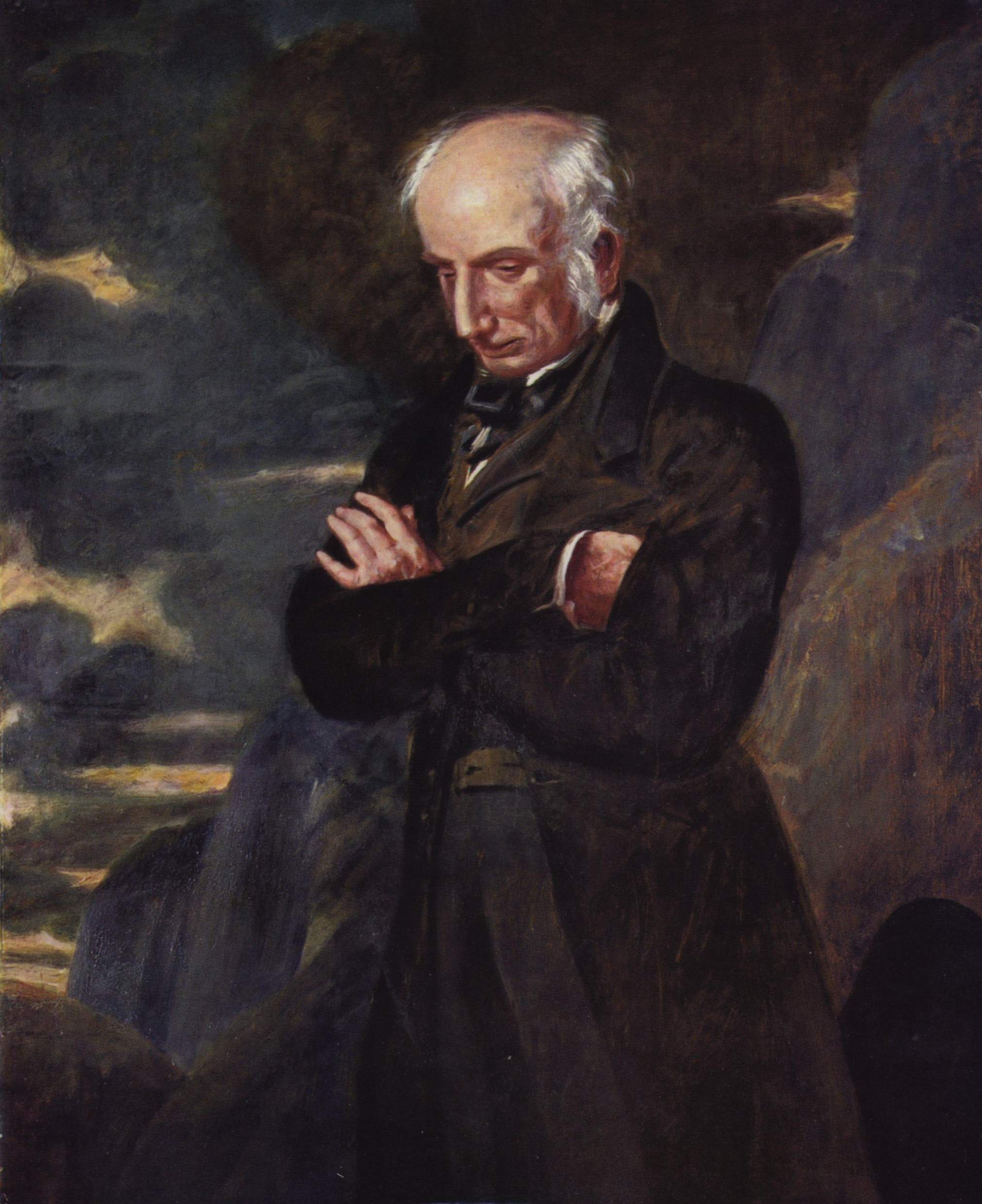“Los placeres recién descubiertos son dulces. Cuando mienten sobre nuestros pies.”
Fuente: To the Same Flower, capítulo 1 (1803).
William Wordsworth fue uno de los más importantes poetas románticos ingleses. Con Samuel Taylor Coleridge, contribuyó a la evolución de la época romántica en la literatura inglesa con su publicación conjunta de Baladas líricas en 1798. Esta obra influyó de modo determinante en el paisaje literario del siglo XIX. Fue el poeta laureado de Inglaterra desde 1843 hasta su muerte en 1850.
El carácter fuertemente innovador de su poesía, ambientada en el sugerente paisaje del Lake District , en el norte de Cumberland, radica en la elección de los protagonistas, personajes de humilde extracción, del tema, que es la vida cotidiana, y del lenguaje, sencillo e inmediato.
Wordsworth, Coleridge y Southey fueron conocidos como lakistas, por inspirarse en el mismo paisaje de los lagos.
Wikipedia

“Los placeres recién descubiertos son dulces. Cuando mienten sobre nuestros pies.”
Fuente: To the Same Flower, capítulo 1 (1803).
“Dulces dias infantiles, que eran siempre. Veinte días son ahora.”
Como una mariposa (I've Watched You Now a Full Half-Hour), sección. 2 (1801).
Fuente: http://www.gutenberg.org/browse/authors/w#a2879
“El arte es expresión de los sentimientos y emociones del artista.”
A Narrow Girdle of Rough Stones and Crags, l. 37 (1803).
Fuente: http://rpo.library.utoronto.ca/redirect/fromlink.cfm?new=poet/363.html
Fuente: Ode: Intimations Of Immortality From Recollections Of Early Childhood
“And homeless near a thousand homes I stood,
And near a thousand tables pined and wanted food.”
Guilt and Sorrow, st. 41 (1791-1794) Section XLI.
Contexto: And oft I thought (my fancy was-so strong)
That I, at last, a resting-place had found:
'Here: will I dwell,' said I,' my whole life long,
Roaming the illimitable waters round;
Here will I live, of all but heaven disowned.
And end my days upon the peaceful flood—
To break my dream the vessel reached its bound;
And homeless near a thousand homes I stood,
And near a thousand tables pined and wanted food.
“Faith is a passionate intuition.”
Fuente: Garbled version of c. l 1295 of Despondency Corrected (Vol. 5 of W's Poetical Works on Gurenberg)
“Pictures deface walls more often than they decorate them.”
This is only a slightly misquoted version of "Pictures deface walls oftener than they decorate them", written by Frank Lloyd Wright in the magazine Architectural Record in March 1908.
Misattributed
“O for a single hour of that Dundee,
Who on that day the word of onset gave!”
Sonnet. In the Pass of Killicranky, l. 11 (1803).
Variante: O for a single hour of that Dundee,
Who on that day the word of onset gave!
“We take no note of time but from its loss.”
Actually Night I, lines 55-56 of Young's Night Thoughts.
Misattributed
Stanza 5.
Ode to Duty http://www.bartleby.com/145/ww271.html (1805)
Matthew.
Bartlett's Familiar Quotations, 10th ed. (1919)
“A youth to whom was given
So much of earth—so much of heaven,
And such impetuous blood.”
Ruth, st. 21 (1799).
Lyrical Ballads (1798–1800)
“The bosom-weight, your stubborn gift,
That no philosophy can lift.”
Presentiments.
Bartlett's Familiar Quotations, 10th ed. (1919)
It Is Not to Be Thought Of, l. 11 (1807).
“A brotherhood of venerable trees.”
Sonnet. Composed at ____ Castle, l. 6.
Memorials of a Tour in Scotland (1803)
“To be a Prodigal's favourite,—then, worse truth,
A Miser's pensioner,—behold our lot!”
The Small Celandine.
Bartlett's Familiar Quotations, 10th ed. (1919)
“The fretful stir
Unprofitable, and the fever of the world
Have hung upon the beatings of my heart.”
Fuente: Bartlett's Familiar Quotations, 10th ed. (1919), Lines completed a few miles above Tintern Abbey.
A Poet!—He Hath Put His Heart to School, l. 9 (1842).
“A cheerful life is what the Muses love,
A soaring spirit is their prime delight.”
From the Dark Chambers of Dejection Freed, l. 13 (1814).
“Enough, if something from our hands have power
To live, and act, and serve the future hour.”
The River Duddon, sonnet 34 - Afterthought, l. 10 (1820).
To ____ . (Let other Bards of Angels sing), st. 3 (1824).
“A day
Spent in a round of strenuous idleness.”
Bk. IV, l. 377.
The Prelude (1799-1805)
“O sylvan Wye! thou wanderer thro' the woods,
How often has my spirit turned to thee!”
Stanza 3.
Lyrical Ballads (1798–1800), Lines written a few miles above Tintern Abbey (1798)
“A noticeable man, with large gray eyes.”
Stanzas written in Thomson's Castle of Indolence.
Bartlett's Familiar Quotations, 10th ed. (1919)
The Matron of Jedborough.
Bartlett's Familiar Quotations, 10th ed. (1919)
Three years she grew in Sun and Shower.
Bartlett's Familiar Quotations, 10th ed. (1919)